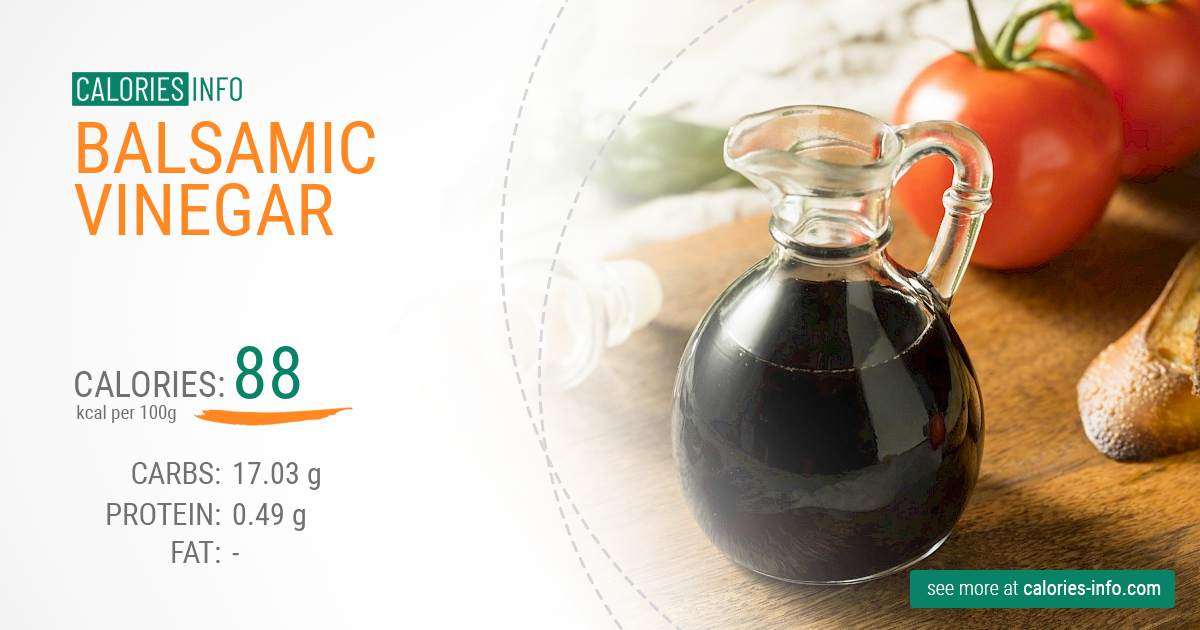Balsamic Vinegar: Calories and Nutrition Analyse
How many calories in balsamic vinegar?

Nutrition Facts
Balsamic VinegarServing size:
standard serving size of balsamic vinegar (16 g) change
5g10g15g20g30g40g50g60g80g100g120g140g160g180g200g220g250g300g350g400g450g500g600g700g800g900g1000g
1oz2oz3oz4oz5oz6oz7oz8oz10oz12oz15oz20oz25oz30oz35oz40oz50oz
Amount Per Serving:
100g of balsamic vinegar contain about 88 calories (kcal).
Calories per:
ounce
| standard serving size, tablespoon
| teaspoon
| cup
| half cup
Case in point, a standard serving size of balsamic vinegar (16 g) contain about 14 calories.
This is about 1% of the daily caloric intake for an average adult with medium weight and activity level (assuming a 2000 kcal daily intake).
Scroll down for details and nutrition tables.
To visualize how much 14 kcal actually is, keep in mind that the calorie content of balsamic vinegar is similar to that of, for example:
- 0.5 cube of sugar
Take a quick look at the tables below for detailed information about balsamic vinegar nutrition.
100g of Balsamic Vinegar
Nutrition
- Calories88
- Carbs Total17.03 g
- Fat0 g
- Protein0.49 g
- Water76.45 g
Vitamins
Minerals
- Potassium112 mg
- Magnessium12 mg
- Calcium27 mg
- Sodium23 mg
- Iron0.72 mg
Discover the Nutritional Profile of Balsamic Vinegar
Balsamic vinegar is not just a condiment; it's a culinary tradition steeped in history, originating from Italy. Known for its complex flavor—sweet, tangy, and bold—balsamic vinegar is a staple in many kitchens around the world. But beyond its unique taste, balsamic vinegar also offers a range of nutritional benefits that might surprise you. Let's dive into the calories in balsamic vinegar, its nutrition content, and how it fits into a healthy diet.
Calories and Macronutrients
When considering balsamic vinegar calories, it's quite low in energy density. A 100-gram serving contains approximately 88 calories. This makes it an excellent choice for adding flavor to dishes without significantly increasing the total calorie count. For those monitoring their intake for weight management or health reasons, balsamic vinegar is a savvy choice.
Regarding macronutrients, balsamic vinegar contains:
- Carbohydrates: 17.03 grams, with 14.95 grams of this being sugars. It's worth noting that it contains no dietary fiber.
- Protein in Balsamic Vinegar: A modest 0.49 grams, making it not a significant source of protein.
- Fat in Balsamic Vinegar: Virtually none, with 0 grams of fat. This includes saturated fats, making it a heart-healthy addition to meals.
Minerals and Vitamins
While not a powerhouse of vitamins, balsamic vinegar does offer some minerals that contribute to a balanced diet. These include:
- Calcium: 27 mg, important for bone health.
- Iron: 0.72 mg, crucial for blood health.
- Magnesium: 12 mg, which supports muscle and nerve function.
- Potassium: 112 mg, beneficial for blood pressure regulation.
- Sodium: 23 mg, which is relatively low, making it a good option for those watching their salt intake.
It's important to note that balsamic vinegar contains no cholesterol, gluten, or significant amounts of vitamins. However, its rich flavor and potential health benefits make it a valuable addition to a balanced diet.
Role in a Healthy Diet
Balsamic vinegar can enhance the taste of salads, grilled vegetables, and even fruits without adding significant calories or fat. Its low calorie and fat content, paired with the absence of cholesterol and gluten, make it an excellent choice for those looking to maintain a healthy diet. Additionally, the presence of certain minerals like calcium and potassium contributes to the overall nutritional value of meals.
However, due to its sugar content, it's wise to use balsamic vinegar in moderation, especially for those monitoring their sugar intake. The key is balance and moderation, as with all foods.
In conclusion, balsamic vinegar is more than just a flavorful addition to your meals; it's a low-calorie, fat-free option that can fit well into a nutritious diet. Whether you're drizzling it over a salad or using it to marinate meats, balsamic vinegar adds depth and complexity to dishes without compromising your health goals.
How many calories are there in 1, 2, 3, or 5 servings of balsamic vinegar?
- Standard serving size of balsamic vinegar (16 g)14 kcal
- Tablespoon of balsamic vinegar (16g)14 kcal
- Teaspoon of balsamic vinegar (5g)4 kcal
- Cup of balsamic vinegar (255g)224 kcal
- Half cup of balsamic vinegar (127.5g)112 kcal
- Ounce (oz) of balsamic vinegar25 kcal
- Half of medium size servings of balsamic vinegar7 kcal
- Small size serving of balsamic vinegar (13g)11.2 kcal
- Big size balsamic vinegar (21g)18.2 kcal
- Two medium size servings of balsamic vinegar28 kcal
- Three medium size servings of balsamic vinegar42 kcal
- Four medium size servings of balsamic vinegar56 kcal
- Five medium size servings of balsamic vinegar70 kcal




Add comment